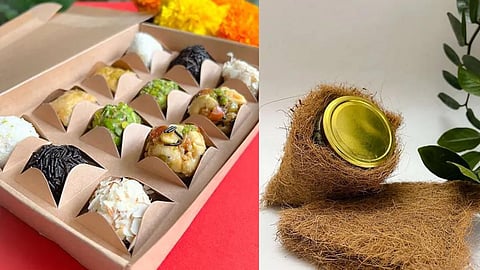
- HOMEGROWN WORLD
- #HGCREATORS
- #HGEXPLORE
- #HGVOICES
- #HGSHOP
- CAREERS
- ABOUT US
- CONTACT US

An opportunistic omnivore, the Indian flapshell turtle will eat anything from vegetation to the occasional thin plastic films used for packaging. With each futile attempt to disentangle itself from the suffocating grip of polythene bags, the plight of this resilient aquatic creature in the Ganga river symbolises the tragic intersection of nature's beauty and the pervasive pollution crisis. As per findings from the Central Pollution Control Board (CPCB), our country produces a staggering annual total of 9.46 million metric tons of plastic waste. Unfortunately, merely 60% of this colossal volume undergoes recycling, while the rest frequently finds its way into landfills, rivers, and oceans.
At the forefront of India's sustainable packaging revolution, Go Do Good Studio is a Pune-based material innovation company that has created a versatile film derived from algae harvested along India's coastal regions. Incorporating a unique proprietary blend, this plastic-free material can be employed for wrapping purposes, heat-sealed into pouches or utilised as a sheet. Over the span of three years, their research-led material lab has successfully cultivated a range of such substitutes for some of the most perilous and environmentally harmful offerings prevalent in the market.
The allure of bubble wrap, with its irresistibly satisfying pop, is a universal delight known to many. However, this seemingly innocent packaging material is primarily made from low-density polyethylene (LDPE), a plastic notorious for its non-biodegradable nature. Fortunately, the heavy duty Good Bubble Wrap Pouch by Go Do Good offers an eco-friendly alternative, a lightweight cushioning material composed of an agro-fibre blend. Its unique composition renders it well-suited for a variety of applications including ceramics, glass, terracotta as well as breakable ware and e-commerce merchandise.
Go Do Good's biodegradable coating is entirely resistant to moisture and grease, serving as a game changing alternative to traditional laminated paper, ideal for everything from mithai boxes and cake boards to personalised packaging. Their printing services are driven by the use of natural plant-based pigments, offering an ink solution devoid of soya and synthetics that demonstrates a commitment to environmental well-being. With a diverse spectrum of over 12 colours at their disposal, clients can expect their designs to come to fruition through an eco-conscious palette.
The company reimagines natural waste by pioneering the creation of wood-free paper sourced from local materials. Water hyacinth, an invasive plant, finds a new purpose in the endeavour to maintain river cleanliness. The resulting product, known as "green paper," is a fibrous pulp-based material that finds applications across diverse sectors.
These products have embarked on a journey, starting from meticulous examination in the company's laboratory and concluding with their delivery to end customers. They have been rigorously tested and proven as effective solutions to combat the global single-use plastic (SUP) problem.
Furthermore, these efforts extend to the betterment of local farmers' livelihoods, providing them with an additional income stream through the utilisation of agricultural waste. To date, the company has successfully replaced more than 200,000 plastic packaging pouches, empowering communities and diverting agro-waste from landfill disposal.
"On a trek in 2015, I saw a heap of plastic in the middle of the remote Himalayan mountains. That's when I realized, plastic has reached from mountain cliffs to the deep sea ocean."
This eye-opening experience marked a pivotal moment in the life of Khushboo Gandhi, a design student accustomed to the hustle and bustle of Mumbai. Delving deeper into the roots of the plastic pollution issue in the country, she discerned that the crux of the problem lay in the behaviour patterns of most individuals in India.
These thoughts and ideals served as the driving force behind the inception of Go Do Good. The unchecked proliferation of single-use plastics and non-biodegradable materials has led to clogged riverbeds and dire consequences for diverse ecosystems. To reverse this disturbing trend, a paradigm shift toward eco-friendly packaging is imperative.
You can browse Go Do Good's packaging solutions here.
